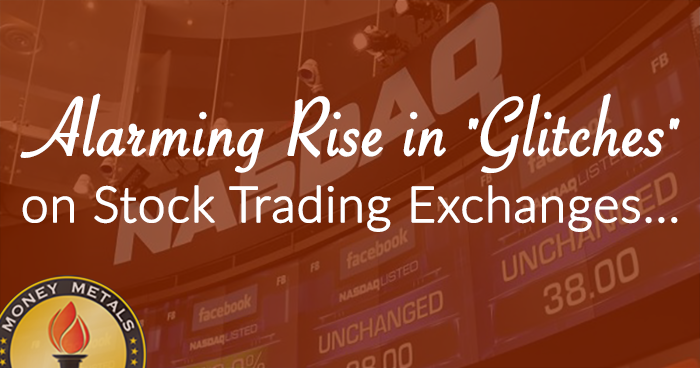Warning Signs Mount: Don't Assume Your Bank and Brokerage Assets Are Safe

Last week, the NASDAQ made headlines after going dark for 3 hours. The electronic stock exchange – where the shares of 3000 companies trade – shut down due to a technical "glitch." Those were long hours for traders wondering when they would be able to buy or sell shares... and at what price.
In the early hours of this Monday morning, another "technical issue" closed the German-based Eurex exchange for more than an hour. Fortunately, in both cases, trading resumed in an orderly manner and investors didn't panic.
But these incidents serve as a warning.
The risks associated with holding bank or brokerage accounts are growing fast. Investors should pause and re-evaluate their asset allocation based on developments in recent years:
- Advancements in technology are adding vulnerabilities. In high-frequency trading, computer algorithms make tens of thousands of trades per second and can precipitate spectacular moves faster than humans can react. The 2010 "Flash Crash" is perhaps the most notable example, but there have been many other examples since. And, as the reliance on technology increases, the exchanges become bigger targets for electronic attacks from hackers and enemies of the U.S. Despite official denials, many speculate that last week's NASDAQ shut-down was related to such an attack.
- Frauds and mismanagement are increasing – even at large and established firms. The 2008 Financial Crisis highlighted that banks and brokerages are hardly the stable and secure institutions they portray themselves to be. They are, in fact, highly leveraged and prone to gambling with complex securities in opaque markets. And the collapses of MF Global and PFG Best provide a reminder that blatant frauds are possible at any firm – regardless of size and reputation.
- Average investors aren't playing on a level field. Last week, programmers at Goldman Sachs mistakenly generated thousands of options trades that resulted in hundreds of millions in losses for the firm. Goldman used its clout to have the trades unwound – good news for them but bad news for the guys on the other end of those trades.
Average investors don't receive this preferential treatment. If you trade in today's markets, you pit yourself against massive firms with high-frequency trading machines, better access to market data, and connections with politicians and regulators who can bend rules in their favor.
- Over-indebted governments worldwide – including the U.S. – are growing increasingly desperate. Bank and brokerage accounts are among the easiest pickings for bureaucrats grasping for funds. Without warning, regulators can close the banks and electronically seize the balances of millions of account holders – just ask bank depositors in Cyprus! Financial assets that are not confiscated outright can still be taxed, monitored, and controlled with relative ease. Lawmakers in Washington, DC are eyeing the trillions of dollars in assets held in retirement accounts. They may one day force investors to purchase U.S. government debt with part of their retirement.
As glitches, frauds, taxes, and financial controls accelerate, you must take action and move a portion of your assets "off the grid." Physical bullion, with zero counter-party risk and enormous privacy advantages, represents THE best way to secure yourself from these risks.

About the Author:
Clint Siegner is a Director at Money Metals Exchange, a precious metals dealer recently named "Best in the USA" by an independent global ratings group. A graduate of Linfield College in Oregon, Siegner puts his experience in business management along with his passion for personal liberty, limited government, and honest money into the development of Money Metals' brand and reach. This includes writing extensively on the bullion markets and their intersection with policy and world affairs.





